Guide to Portugal Digital Nomad Visa: Your Path to Remote Work in Europe
Guide to Portugal’s Digital Nomad Visa (D8) 2025: requirements, application process, costs, and best cities for remote work.
September 17, 2025
September 29, 2025
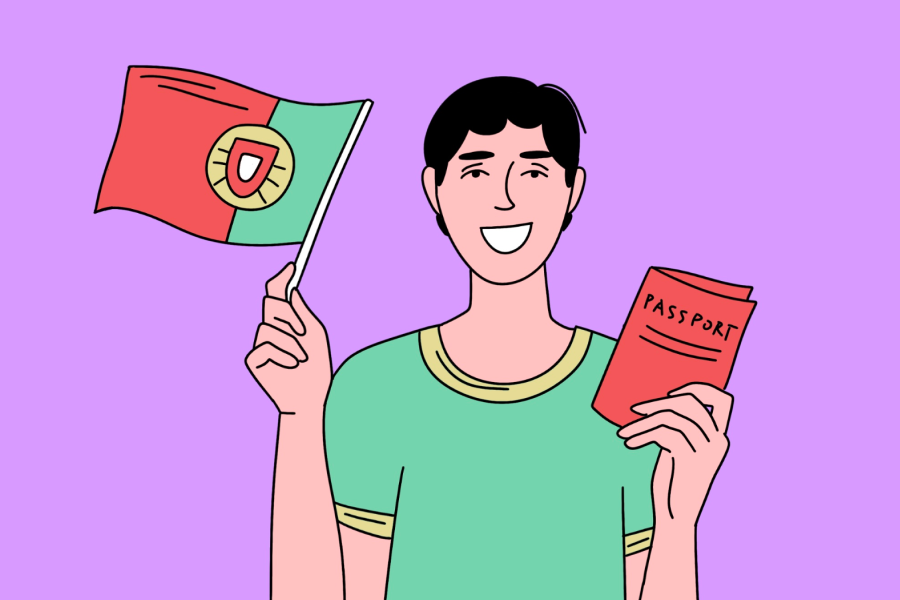
Key points
Portugal’s D8 Digital Nomad Visa is designed for remote workers earning at least 3,480 EUR/month.
Applicants must show proof of income, savings, insurance, and accommodation when applying.
The visa comes in two forms: a 1-year temporary stay and a residence visa leading to permits.
Lisbon, Porto, and Madeira are top nomad hubs.
Portugal has become one of Europe’s most popular destinations for freelancers and solopreneurs working remotely. The country’s digital nomad visa allows non-EU citizens to live in Portugal while continuing to work for clients or companies abroad. With clear income requirements, straightforward paperwork, and a path to long-term residence, the Portuguese nomad visa may be the right choice for you.

Why move to Portugal?
Portugal has everything a remote worker could want: a sunny climate, affordable living compared to much of Western Europe, and a strong community of young professionals from all over the world. In fact, Portugal is among Solowise’s top location choices for digital nomads!
Lisbon and Porto are thriving tech hubs with coworking spaces on every corner, while Madeira has its own dedicated nomad village. On top of the climate and lifestyle, the country also offers a new tax regime called the IFICI (Tax Incentive for Scientific Research and Innovation), introduced in 2025, which applies a flat 20% rate for eligible workers.
Add in reliable internet, great food, and easy access to the rest of Europe, and it’s clear why Portugal has become one of the most attractive bases for people working remotely.
I chose Portugal because of its welcoming culture, strong digital infrastructure, and great quality of life for remote workers. Lisbon stood out with its vibrant tech scene, coworking spaces, and mild climate, making it a perfect base to build my startup while enjoying a balanced lifestyle.
{{Daria Turanska}}
What is the Portugal digital nomad visa (D8)?
Portugal launched the Digital Nomad Visa (D8) in 2022 to give remote workers a clear, legal way to live in the country while working for clients or employers abroad. Here’s where things get a little confusing: D8 qualifies as both a “temporary stay” and a “residence visa.” In both cases, you have to apply at a Portuguese consulate. Both visas need the same docs. The only difference: long-term holders must apply for a residence permit in Portugal, temporary ones don’t.
D8 temporary stay
The D8 temporary stay visa allows you to stay in Portugal for up to 12 months. It’s a multiple-entry visa, which means you can leave and come back to Portugal as you wish. Portuguese government sources do not clearly state whether this visa can be renewed. Some visa consultancy sites claim you can renew it for short periods; others say it is non-renewable. What is clear, however, is that the temporary stay visa alone does not lead to permanent residence or citizenship.
The temporary stay visa may be a sensible idea for remote workers who know they’ll only be in Portugal for a limited period of time, or those who want to spend more than a tourist stint in the country without getting too involved with local bureaucracy.
D8 residence visa
The D8 residence visa is valid for four months. Once you get this visa and arrive in Portugal, you’re supposed to schedule an appointment with AIMA (the Portuguese immigration office, formerly SEF). At this appointment, you apply for a residence permit, which is issued as a plastic ID card.
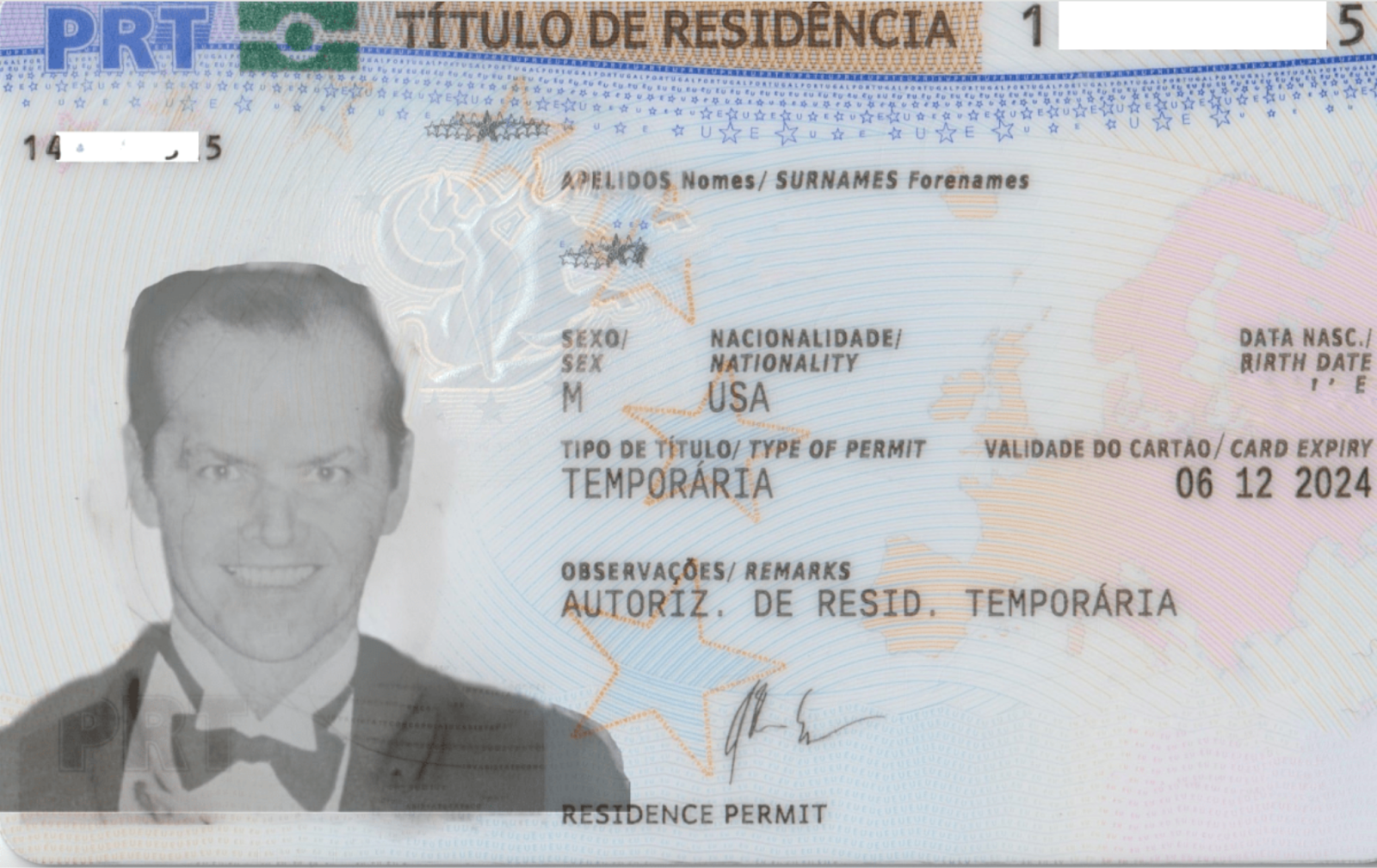
The first residence permit is valid for two years. After that, you can renew it. Once you have lived in Portugal for a total of five years, you may apply for permanent residence or Portuguese citizenship. If you go for this option, make sure you pay close attention to local news and laws. There have been news reports about possible changes to the number of years required before applying for Portuguese citizenship.
This route is more suitable for remote workers and freelancers who plan to stay long term, build a base in Portugal, bring their family, or eventually gain EU residency rights.
How much does it cost?
According to the Portuguese Foreign Ministry, the cost of application for a national visa (and D8 counts as one) is 110 euros, payable in local currency.
If you decide to get the D8 residence visa, you’ll also have to pay for the processing of your application and the card itself. In total, it’s about 150 euros.
Eligibility and requirements for the Portuguese digital nomad visa
There are several requirements you must satisfy to be eligible for the nomad visa.
Age and nationality
To qualify, you must be over 18 and you must be a non-EU/EEA national. This basically means you’re from a country that’s not a member of the European Union, Switzerland, Iceland, Liechtenstein, or Norway. In other words, if you already hold an EU, EEA, or Swiss passport, you don’t need the D8 visa; you can live and work in Portugal freely under free movement agreements.
Financial requirements
You must earn at least 3,480 euros a month from fully remote work as a freelancer or on a permanent contract. Also, you need to show that you have at least 10,440 euros in your bank account. These are the figures for 2025. Since they’re tied to the Portuguese minimum wage, they’re likely to increase in the future.
If you’re planning to bring your family, you’ll need to show more money in your bank account: about 5,220 EUR for each adult and 3,132 EUR for each child.
How to apply?
Let’s walk through the application process and all the documents necessary, step by step. As with many countries (Turkey, I’m looking at you), Portugal’s rules don’t always come across as crystal clear. Different consulates may interpret requirements differently, so always double-check with the one handling your application.
The list of documents
Here’s the full list of documents you’ll need to submit to the consulate, according to the Portuguese Foreign Ministry (be wary – they may request additional documents).
- Visa application form: filled out and signed (parents/guardians sign for minors).
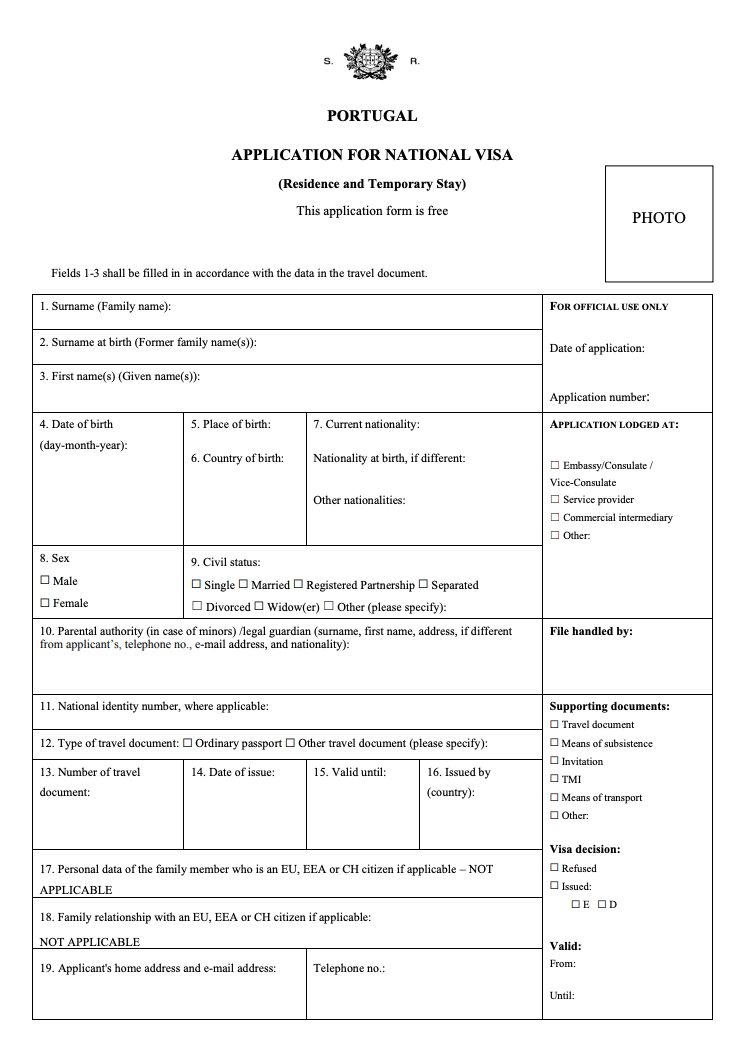
- Two passport photos: recent, standard size, good quality.
- Passport: valid for at least 3 months after your planned stay. Include a photocopy of the ID page.
- Proof of legal stay if you’re applying from a country that’s not your own.
- Travel insurance: must cover healthcare, emergencies, and repatriation.
- Criminal record certificate from your country of nationality and any country where you’ve lived for more than a year. Needs an apostille and translation into Portuguese.
- Tickets to Portugal
- Documents showing your current tax residence
- Proof of financial means (a bank statement proving you earn at least 3,480 euros a month and a bank statement proving you have at least 10,440 euros as savings)
- Proof of remote work (like a work contract or a partnership agreement)
In practice, consulates also ask for the following:
- Tax receipts
- Proof of accommodation, like a 12-month rental contract or certificate of real estate ownership
- A letter in English, explaining the applicant’s motivation to move to Portugal.
My advice for anyone applying is to start preparing your documentation early, double-check each requirement, and reach out to local expat communities — they’re incredibly helpful with practical tips and support.
{{Daria Turanska}}
The application process itself
- Gather all required documents.
- Book an appointment at your local Portuguese consulate (often via VFS Global).
- Submit your application in person and pay the fee.
- Wait for processing (typically 30–90 days, but it varies).
- If approved, collect your visa and travel to Portugal.
- If on the residence track, book an appointment with AIMA after arrival to get your residence permit card.
The D8 visa application was straightforward but required careful preparation. The biggest challenge was gathering official documents like proof of income and valid health insurance, which took longer than expected, especially coordinating between different countries’ systems. The good news is that Portugal’s authorities were clear on requirements, and once submitted, the process moved smoothly.
{{Daria Turanska}}
Living in Portugal as a digital nomad
The paperwork is behind you — visa approved, residence permit in hand. Now comes the fun part: settling in and actually living your digital nomad life.
Cost of living here as a freelancer is reasonable compared to other Western European capitals — housing can be pricey in central Lisbon, but overall expenses balance out with good public transport and affordable food options.
{{Daria Turanska}}
Best cities for digital nomads
Here are some of our top picks in terms of cities for remote workers. To get an idea of rental prices in each city, check out a few real estate websites like idealista or imovirtual.
Lisbon
Lisbon blends old-world charm with modern nomad life. Think tiled walls, ocean views, buzzing coworking hubs, and a big international crowd. The Internet is reliable, English is widely spoken in central areas, and the airport connects you to the rest of Europe in a few hours. Housing can be pricey, but the city’s mix of culture, sunshine, and community keeps digital nomads coming.
Porto
Portugal’s second city — and the one the country was named after — has a slower pace than Lisbon but plenty of charm. With cobblestone streets, riverside cafés, and a growing startup scene, it’s a favorite for remote workers seeking a balance of history and modern life. Cheaper than Lisbon and well connected by metro and trains, Porto also offers the bonus of world-famous wine culture.
Madeira
Now, Madeira isn’t a city, but I would be remiss not to include it on my list of top locations for remote workers. With its year-round spring climate, dramatic mountain views, and dedicated “Nomad Village,” the island has become a true haven for freelancers and entrepreneurs seeking both community and natural beauty.
Internet, SIM cards, and coworking culture
Portugal is well-connected, so you won’t struggle to stay online. Mobile data is cheap compared to much of Europe, and providers like Vodafone, MEO, and NOS all offer prepaid SIM cards that are easy to pick up at the airport or in city shops. Internet speeds are more than enough for video calls and heavy remote work.

What about taxes?
If you stay in Portugal for more than 183 days in a 12-month period, you’re considered a tax resident. That means you’ll need to register with the Portuguese tax authority and pay income tax locally.
Portugal used to offer the popular Non-Habitual Resident (NHR) scheme, but it ended in 2025. In its place, the new IFICI program (Tax Incentive for Scientific Research and Innovation) offers a flat 20% rate for certain qualified workers. For everyone else, regular progressive tax rates apply, ranging from 14.5% to 48%.
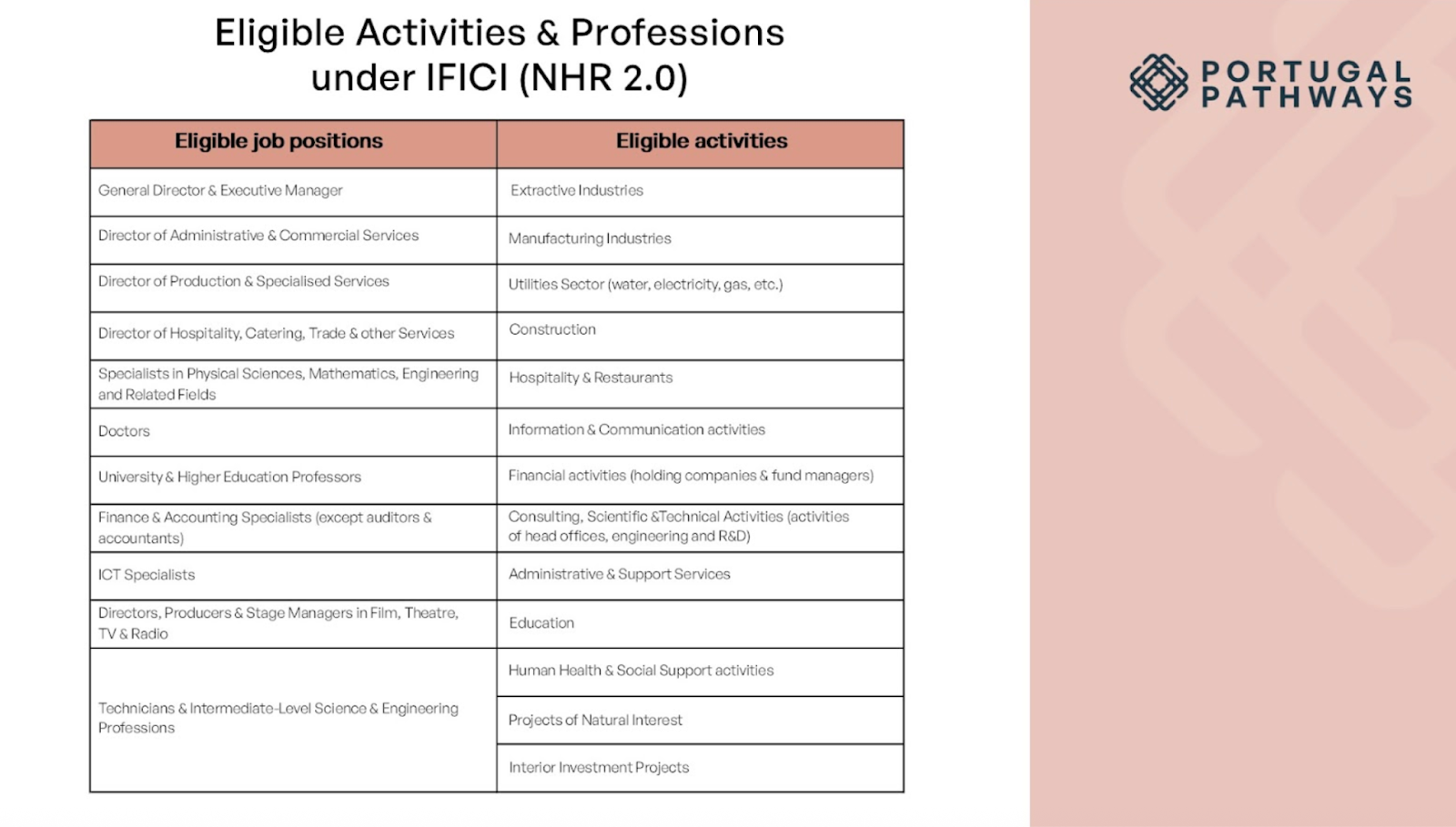
In conclusion
Portugal’s D8 visa opens the door to one of Europe’s most attractive destinations for remote workers, combining sun, culture, and strong digital infrastructure. While the paperwork can feel overwhelming, once it’s done, you’ll be free to enjoy the lifestyle that makes Portugal a top choice for digital nomads. Need inspo? Check out Solowise’s favourite digital nomad YouTubers.
FAQ
Can I bring my family on the D8 visa?
Yes, but only under the D8 residence visa. This applies to the main applicant’s spouse or long-term partner, parents over 65, children under 18, or children under the age of 30 if they’re unmarried and dependent on the main applicant. You’ll need to show extra savings to cover them. Each family member will also need their own paperwork, like passports, birth or marriage certificates, and proof of relationship, and their own appointment at the consulate.
How can I open a bank account in Portugal?
Opening a bank account in Portugal is fairly straightforward. You’ll need a NIF (tax number), proof of identity (passport), proof of address, and proof of income. Popular banks include Millennium BCP, Caixa Geral de Depósitos, Santander, Novo Banco, and BPI. Once you’ve gathered the documents, head to a branch, submit your application, and you’ll usually walk out with an account and debit card ready to activate. Many expats use service companies to get a NIF and open an account remotely before moving.
What alternatives to D8 are there?
If you don’t satisfy some of the requirements for the D8 visa, but would love to move to Portugal anyway, don’t despair. There are some other options out there which may be right for you. The D7 visa is for people with stable passive income like pensions, rent, or dividends. The Startup Visa targets entrepreneurs with innovative projects backed by an incubator, while the D2 Business Visa is for those starting or buying a business that doesn’t have to be innovative.
We are here to ease your working routine
Whether you're freelancing or a full-time contractor, we simplify the working process, putting you in control.
Try it free


Gig driving is one of the quickest ways to find job opportunities and make extra money. Check our complete guide for independent contractor drivers in 2026, with tips and best practices to help you earn more.
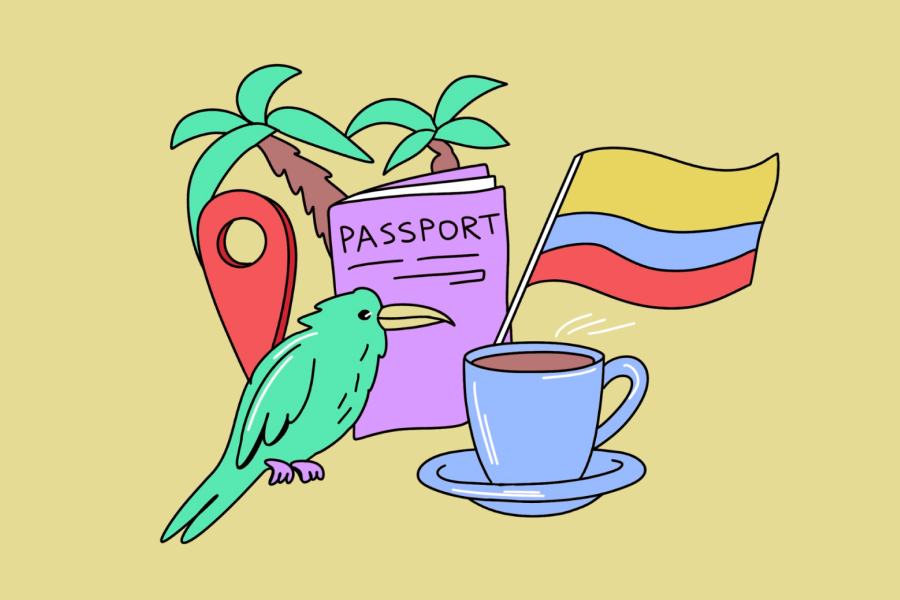
Colombia Digital Nomad Visa: learn how to apply, eligibility requirements, and best spots for remote work in one of the most biodiverse countries.

Discover the essential steps to become a copywriter, from understanding the role and choosing your career path to landing your first clients and scaling your rates. Learn which skills matter most, how to build a portfolio, and practical strategies to grow a sustainable copywriting career in 2026.


.JPG)